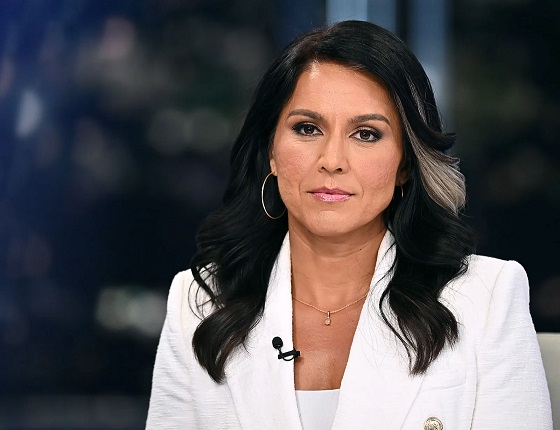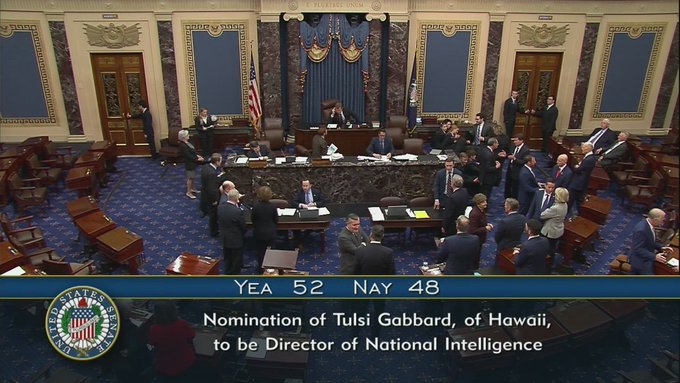espionage
Tulsi Gabbard confirmed as Trump’s Director of National Intelligence

Quick Hit:
The Senate on Wednesday confirmed former Democrat congresswoman Tulsi Gabbard as President Donald Trump’s director of national intelligence. The vote, which passed mostly along party lines at 52-48, followed weeks of intense debate over Gabbard’s past views on intelligence operations and foreign policy.


Key Details:
-
Gabbard, who represented Hawaii in Congress for eight years, faced sharp scrutiny from both parties over her past comments on U.S. adversaries, surveillance programs, and her stance on Edward Snowden.
-
Senate Intelligence Committee Republicans approved her nomination last week after she provided follow-up answers addressing their concerns. Some GOP lawmakers had initially resisted, citing worries over her foreign policy positions.
-
Senate Minority Leader Chuck Schumer opposed the confirmation, claiming that Gabbard “wouldn’t receive more than ten votes” if Republicans were allowed to vote in secret.
Diving Deeper:
Tulsi Gabbard, a former Democrat congresswoman from Hawaii turned Trump ally, was confirmed Wednesday as the director of national intelligence following a 52-48 Senate vote that split mostly along party lines. Former GOP Senate Leader Mitch McConnell was the only Republican to join all Democrats in voting against Gabbard, and the confirmation marks one of President Trump’s most controversial intelligence appointments, with Gabbard facing intense questioning over her positions on classified intelligence and foreign adversaries.
Gabbard’s past remarks and actions drew bipartisan concern, particularly her defense of Edward Snowden, her prior skepticism of U.S. intelligence assessments on Syria’s Bashar al-Assad, and her opposition to surveillance authorities like Section 702. Senate Intelligence Committee Republicans had initially hesitated on her nomination, but they ultimately backed her after she responded to follow-up inquiries about her positions on national security.
Virginia Sen. Mark Warner, the ranking Democrat on the Intelligence Committee, claimed that Gabbard was unfit for the role, accusing her of “publicly defending Snowden after he compromised our nation’s most sensitive collection sources and methods.” Warner also criticized her past statements blaming the U.S. and NATO for Russia’s invasion of Ukraine and her meeting with a controversial Syrian cleric.
During confirmation hearings, Gabbard refuted accusations that she harbored sympathies for foreign adversaries, calling the allegations “offensive.” She defended her record on national security and insisted that while she disagreed with Snowden’s actions, her proposed intelligence reforms would prevent similar leaks in the future.
Senate Republicans ultimately rallied behind Gabbard, with Senate Republican Whip John Barrasso pushing back on accusations that she had echoed Kremlin propaganda. He pointed to her past support for sanctions against Russia and Iran, as well as her backing of military aid to Ukraine after Russia’s 2014 annexation of Crimea.
Schumer and other Senate Democrats urged Republicans to resist pressure from the Trump administration, claiming that GOP lawmakers were putting politics ahead of national security. Despite these objections, the confirmation moved forward, concluding a bitterly divided debate over Gabbard’s appointment to lead the nation’s intelligence operations.
2025 Federal Election
Researchers Link China’s Intelligence and Elite Influence Arms to B.C. Government, Liberal Party, and Trudeau-Appointed Senator

 Sam Cooper
Sam Cooper
“The PRC uses its UFWD in Canada and around the world to stifle criticism and manipulate Canadian communities. These activities constitute a threat to Canada’s sovereignty and to the safety of Canadians.”
A powerful new investigative map released by diaspora researchers traces political ties reaching from Chinese Communist Party-controlled intelligence networks to the highest levels of British Columbia’s government. The visual exposé centers on Senator Yuen Pau Woo and his pivotal role in welcoming Chinese state-linked entities into Canadian institutions—an effort that resonates in a secretly recorded 2020 meeting obtained by The Bureau, in which Woo assured United Front figures he would help shield them from critical scrutiny.
These same United Front entities have been credited by Beijing for their role in promoting Chinese Canadian candidates during federal election campaigns.

Woo was appointed to the Senate by Prime Minister Justin Trudeau in 2016, with an official announcement citing his work with the same entities now identified by diaspora researchers as Chinese-influenced trade lobbies.
The map, titled “From Ottawa to Victoria,” is part of the ongoing Dotting the Map series from Canadian Friends of Hong Kong and Found in Translation, two diaspora-led civil society groups. Built from open-source records, the map draws direct lines between United Front-aligned business, political, and media organizations and prominent Canadian leaders, including Senator Woo, former BC Liberal Premier Christy Clark, ex-minister Teresa Wat, Premier David Eby’s advisor Ding Guo, and Rise Media journalists.
The researchers caution that no individual named in their report is alleged to be knowingly involved in Chinese influence activities. Rather, the mapping effort is designed to educate voters by highlighting verified affiliations to Chinese state or military-linked organizations.
Rise Media—as reported by The Bureau—played a key role in supporting Mark Carney’s current Liberal candidate Parm Bains in the 2021 contest, in which Bains upset Conservative incumbent Kenny Chiu. That Richmond riding is one of the top three examples of Chinese election interference overturning Conservative candidates, according to former Conservative leader Erin O’Toole.
At the center of the new Dotting the Map diagram is Senator Woo, shown helping open pathways for China Poly Group, a state conglomerate tied to the People’s Liberation Army, and Poly Culture, its cultural diplomacy arm. The map shows that under the Liberal Christy Clark government—with Woo’s active involvement—British Columbia approved multi-million-dollar partnerships with numerous shadowy Chinese entities via HQ Vancouver, a Canadian “public-private” entity created to draw foreign investment into Canada.
Woo’s name is also linked through board roles and event partnerships to the Asia Pacific Foundation of Canada and various CCP-aligned think tanks, including those tied through joint programming to the International Liaison Department, a CCP foreign intelligence arm.
According to the map, Woo co-organized a 2010 event in Canada with Henry Huiyao Wang, founder of the Centre for China & Globalization—a think tank under the ILD that directly advises the Chinese State Council. Wang and Woo co-wrote articles and maintained overt links through the Asia Pacific Foundation during Woo’s tenure as president and CEO.
According to political scientist Anne-Marie Brady, the ILD is “tasked with gathering intelligence on foreign politicians and political parties, and developing asset relations with them.”
In Justin Trudeau’s October 2016 appointment notice, Woo is credited for works including:
“As President and CEO of the Asia Pacific Foundation of Canada from 2005 to 2014, he led a major expansion of the organization and spearheaded the ‘National Conversation on Asia’, a three-year cross-Canada campaign to highlight the growing importance of Asia in the world and for Canada. Currently, he serves as President of HQ Vancouver, a public-private partnership established to promote British Columbia as a head office location for global firms.”
According to the map, Teresa Wat, while serving as a minister in Christy Clark’s Liberal government, extended Belt and Road cooperation to British Columbia, joined Huawei and a local telecom firm in 5G research initiatives, participated in multiple PRC-affiliated delegations, and came from a background in Chinese state-linked media. She is also listed as having facilitated the involvement of Chinese real estate tycoons in provincial-level discussions on infrastructure and housing.
The map identifies Ding Guo, founder of the Canada Committee 100 Society (CCS100), as a critical node. Guo is shown as a journalist from Shanghai who transitioned into a leadership role in B.C. Chinese-language media and political mobilization.
As previously reported by The Bureau, in December 2021, then-Attorney General David Eby approved a $20,000 provincial grant to CCS100, citing its anti-racism and Chinese diaspora engagement goals. The grant was awarded while Guo served as a Chinese community advisor to Eby. A February 2021 report from a Chinese Communist Party organ cited CCS100 among several Canadian groups praised for “voter education, mobilization, and fundraising” efforts during the 2019 election cycle.
Premier Eby also awarded Ding Guo the King Charles III Coronation Medal, the researchers found.
Kenny Zhang, also named in the map, is shown occupying a dual role as a former executive director of HQ Vancouver and head researcher with Ding Guo’s CCS100. He was affiliated with Rise Media, which promoted Liberal candidate Parm Bains over MP Kenny Chiu during the 2021 federal election campaign—and Zhang was also awarded a King Charles III Coronation Medal by Senator Yuen Pau Woo.
The Bureau’s publication of the “Woo Tape” forms part of the evidentiary spine of the researchers’ latest map. All three—Ding Guo, Kenny Zhang, and Senator Yuen Pau Woo—were present in this groundbreaking piece of evidence.
In the May 2020 recording, Senator Woo tells CCS100 leaders, including Ding Guo, that he will help protect their organizations from scrutiny in Canadian public discourse, including inside Parliament.
The remote-online meeting, captured on audio and visual files held by The Bureau, included figures tied to United Front-linked institutions and media outlets aligned with PRC narratives. In the meeting, Woo states: “Whether you belong to an organization, that happens to be listed as a United Front organization, should not be a litmus test.”
He continues: “I am fighting very hard,” against this type of criticism.
The statements closely mirror the PRC’s own foreign messaging, which frequently defends its overseas political networks as benign civic or cultural organizations.
When The Bureau sent detailed questions to Senator Woo regarding the recording, Woo advised that questions should be directed to the Hogue Commission.
The Bureau also provided the tape-recorded evidence to CSIS and asked the Service to comment on whether the statements are relevant to Woo’s intervener status in the Hogue Commission.
“Individuals purposefully aligning themselves with United Front Work Department (UFWD) designated organizations should understand its ongoing actions targeting members of Canadian communities with harassment, manipulation or intimidation,” spokesman Eric Balsam wrote, in a statement that didn’t name Senator Woo. “The PRC uses its UFWD in Canada and around the world to stifle criticism and manipulate Canadian communities. These activities constitute a threat to Canada’s sovereignty and to the safety of Canadians.”
The researchers’ findings—meant to educate voters during a Canadian election in which Prime Minister Mark Carney has already been boosted by disinformation from elite Chinese Communist Party intelligence entities—take on added significance in light of sections of the map that link Senator Woo, the Asia Pacific Foundation of Canada, and affiliated organizations to the International Liaison Department (ILD).
The ILD is a powerful arm of the Chinese Communist Party that experts identify as a covert influence and foreign intelligence agency operating globally on behalf of Beijing’s political interests.
In his 2022 book, Spies and Lies: How China’s Greatest Covert Operations Fooled the World, author and analyst Alex Joske details how the ILD has historically conducted clandestine activities aimed at shaping foreign perceptions and policymaking in favor of the CCP. His research shows that the department plays a central role in executing covert influence operations targeting political, business, and academic elites abroad.
Meanwhile, as previously reported by The Bureau, a report that praised Premier David Eby’s advisor Ding Guo for helping mobilize Chinese Canadian voters in 2019 also highlighted the importance of the Liberal Party leader’s outreach to the Chinese community in that contest. It noted that “Trudeau Jr. personally went to seek votes at a Chinese supermarket in Markham, an area of Toronto where Chinese people live, demonstrating that Chinese votes play an important role in the general election.”
The report, published by ACFROC (a United Front-linked organization), also emphasized the key role of WeChat in rallying voters. It said 41 federal election candidates seen as “of special interest” to Beijing were nominated by different parties in the 2019 race—an increase from “only 27 and 23 in 2015 and 2011.”
Charles Burton, a respected China expert and Mandarin-language analyst, reviewed the report for The Bureau. He said the document “identifies 41 ‘distinguished’ Chinese candidates nominated in 2019, so I judge that the use of ‘distinguished’ implies identification of candidates potentially useful to the United Front’s aims.”
The Bureau is a reader-supported publication.
To receive new posts and support my work, consider becoming a free or paid subscriber.
For the full experience, please upgrade your subscription and support a public interest startup.
We break international stories and this requires elite expertise, time and legal costs.
Invite your friends and earn rewards
2025 Federal Election
RCMP memo warns of Chinese interference on Canadian university campuses to affect election

From LifeSiteNews
The Royal Canadian Mounted Police singled out China as the only nation of interest, noting that the ‘threat posed by the People’s Republic and its powerful security and intelligence apparatus’ remains a ‘concern.’
An internal briefing note from Canada’s top police force warned that agents of the Communist Chinese Party (CCP) are targeting Canadian universities to intimidate them and in some instances challenge them on their “political positions.”
The December 3, 2024, memo titled On-Campus Foreign Interference from the Royal Canadian Mounted Police (RCMP) did not mention specific universities by name but noted that foreign interference was sophisticated and came solely from China.
The memo stated that as Canada’s academic institutions rely on “open, creative and collaborative environments” to foster independent debate, some “foreign intelligence services and government officials including the People’s Republic of China can exploit this culture of openness to monitor and coerce students, faculty and other university officials.”
“On university campuses foreign states may seek to exert undue influence, covertly and through proxies, by harassing dissidents and suppressing academic freedoms and free speech that are not aligned with their political interests,” the RCMP noted in the memo.
The memo noted that foreign agents’ influence in “public debate at academic institutions” may lead to them sponsoring “specific events to shape discussion rather than engage in free debate and dialogue.”
“They may also directly or indirectly attempt to disrupt public events or other on-campus activities they perceive as challenging their political positions and spread disinformation, undermining confidence in academic discourse and expertise,” the memo observed.
Notably, the memo singled out China, and thus the CCP, as the only nation of interest, noting that the “threat posed by the People’s Republic and its powerful security and intelligence apparatus including malign activities targeting our democratic institutions, communities and economic prosperity” remains a “concern.”
Some of the activities that foreign agents engaged included the recruitment of CCP sympathizers and “in some instances,” noted the memo, saw students be “pressured to participate in activities that are covertly organized by a foreign power.”
“Universities can also be used as venues for ‘talent spotting’ and intelligence collection in specific circumstances,” the memo stated.
The final report from the Foreign Interference Commission concluded that operatives from China may have had a hand in helping to elect a handful of MPs in both the 2019 and 2021 Canadian federal elections. It also concluded that China was the primary foreign interference threat to Canada.
According to hearings from a 2021 House of Commons Special Committee on Canada-China Relations, there were numerous documented incidents of CCP intimidation.
For example, a Tibetan Canadian, Chemi Lhamo, testified she got death threats after she ran for student council president at the University of Toronto’s Scarborough campus.
“There were comments saying the bullet that would go through me was made in China,” she said, noting that “Community members of the allied nations who are subjected to the Chinese Communist Party’s colonial violence are not alien to these tactics. We have witnessed China’s interference and influence not just in our university campuses but also in our communities.”
Earlier this week, LifeSiteNews reported that Canada’s Security and Intelligence Threats to Elections Task Force (SITE) confirmed the CCP government was behind an online “operation” on WeChat to paint Prime Minister Mark Carney in a positive light.
Canadians will head to the polls in a general election on April 28.
LifeSiteNews reported last week that the Liberal Party under Carney, has thus far seen no less than three MP candidates drop out of the election race over allegations of foreign interference.
LifeSiteNews recently reported how the Conservative Party sounded the alarm by sharing a 2016 video of Carney saying the Communist Chinese regime’s “perspective” on things is “one of its many strengths.”
As reported by LifeSiteNews, a new exposé by investigative journalist Sam Cooper claims there is compelling evidence that Carney and former Prime Minister Justin Trudeau are strongly influenced by an “elite network” of foreign actors, including those with ties to China and the World Economic Forum.
-

 2025 Federal Election2 days ago
2025 Federal Election2 days agoCommunist China helped boost Mark Carney’s image on social media, election watchdog reports
-

 2025 Federal Election1 day ago
2025 Federal Election1 day agoRCMP memo warns of Chinese interference on Canadian university campuses to affect election
-

 2025 Federal Election2 days ago
2025 Federal Election2 days agoFifty Shades of Mark Carney
-

 2025 Federal Election22 hours ago
2025 Federal Election22 hours agoResearchers Link China’s Intelligence and Elite Influence Arms to B.C. Government, Liberal Party, and Trudeau-Appointed Senator
-

 Energy2 days ago
Energy2 days agoTrump signs four executive orders promoting coal industry
-

 COVID-1919 hours ago
COVID-1919 hours agoFauci, top COVID officials have criminal referral requests filed against them in 7 states
-

 2025 Federal Election2 days ago
2025 Federal Election2 days agoConservative Party urges investigation into Carney plan to spend $1 billion on heat pumps
-

 MAiD2 days ago
MAiD2 days agoDisability rights panel calls out Canada, US states pushing euthanasia on sick patients










